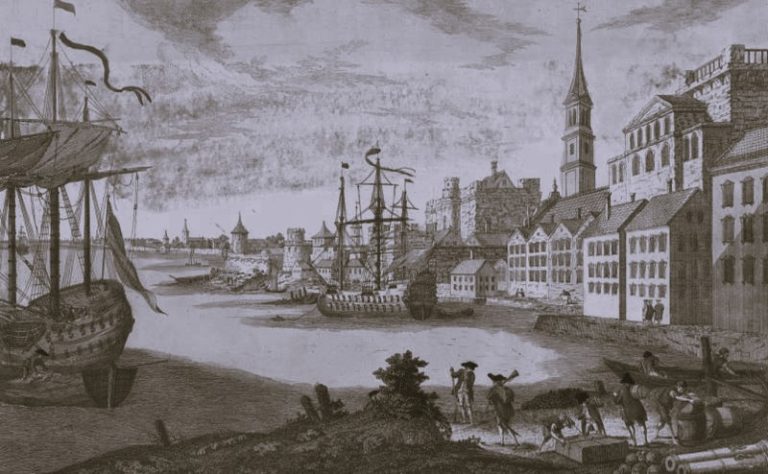

By Robert Barboza
This 200-year old patriotic story begins with a single reference spotted in an online history database, listing all the captured American ships reported to the Royal Navy headquarters in Halifax, Nova Scotia during the War of 1812 with Great Britain.
Fair Haven, Rhode Island was listed as the home port of the American privateer schooner Governor Gerry, 250 tons and carrying 18 guns, captured by one of His Majesty’s warships on May 31, 1813 in the North Atlantic. Captain Joshua Hitch was recorded as master of the captured schooner.
Having never heard of Fair Haven, Rhode Island, a quick Google search indeed proved such a place did not exist. The record keeper had made a mistake… it should be Fair Haven, Massachusetts.

History tells us the captured American vessel would be manned with a British prize crew and sent into Halifax for likely condemnation and sale by the Vice Admiralty maritime court located there.
The captured officers and seamen of the Governor Gerry – mostly local men from Fairhaven, Acushnet, Bedford Village and other Old Dartmouth townships – would have had the choice of enlisting in the Royal Navy or being sent to a British prison.
None of the local men signed on to captor ship’s muster rolls. Hitch and all of the prisoners were shipped back to England to endure months or years of captivity. A lucky few escaped and caught on with some ship leaving port, and slowly made their way back to New England as best they could.
Governor Gerry was launched in Fair Haven in mid-October of 1812, and likely spent another month getting masts and rigging and sails set up and fine-tuned. An unattributed report says she was “a most beautiful vessel” which local experts predicted would be “a remarkable sailer” when ready for sea.
The entry indicates that the fleet schooner had been built in a remarkable 48 days. Construction had certainly been rushed by the owners to take opportunity of the privateering commissions being issued by Massachusetts since the war’s start.
The maritime trades were the heart of the local economy, and men of war were needed to fend off the Royal Navy, and capture what enemy shipping they could. Virtually all state-commissioned privateers were former merchant vessels which simply had their sides pierced for cannon, perhaps after the bulwarks had been reinforced to better withstand enemy fire.
The official History of the City of New Bedford continues the tragic story of Captain Joshua Hitch and his Old Dartmouth crew. “She was a fast schooner and well equipped for the business” of being a privateer, the reference says.
Hitch likely waited for mild winter weather and sailed up and down the coast for a month or two on shakedown cruises that winter. It would take time to build up a crew of good sailors that knew how to handle those 18 cannon in a fight.
In the spring, the privateer was ready for longer cruises, and a quick crossing to France with trade goods was planned by the owners. Common exports to Europe in those days included lumber, barrel staves, corn or other local produce, and often, barrels of dried salt cod.
The Fairhaven men, being smart businessmen, outfitted the ship with some profitable cargo, and sent Captain Hitch and crew off to France. Armed or not, a fast ship could often run through the British navy’s aggressive blockade of American ports, started as soon as war was declared in 1812, and still pick up some valuable cargo abroad.
The records of the Vice-Admiralty Court at Halifax tell us that Governor Gerry was leaving a French port on July 19, 1813 with a cargo of silks and other trade goods when she ran into a squadron of British men-of-war. The American ship tried to flee, but was battered by its Royal Navy pursuers and captured.
A Hitch family web page says the schooner surrendered only after her spars had been carried away by enemy cannon fire. With wounded men, a crippled ship, and no chance of escape, Hitch lowered his flag and surrendered without Governor Gerry ever having taken an enemy vessel. He and his crew ended up in prison in England.
The online History of the City of New Bedford also tells of another Fairhaven privateer in the War of 1812, the 40-foot sloop Camelion, nick-named “The Handsaw” because one of its owners toasted her and proclaimed “Our Enemies— May they be lathered with aquafortis and shaved with a handsaw” at some public gathering.
Camelion had only a single swivel gun, a short-range weapon meant to spew buckshot towards enemy decks, so the privateer kept close to shore on short cruises. The online history relates that sometime in 1814, off the coast of Maine, she was “closely pursued” by a British ship and “run ashore” so the crew could escape.
In his accounting of the War of 1812 in Historical Sketches of Old Dartmouth, Vol. 6, printed in 1904, local historian George H. Tripp authored a report entitled “The Town of Fairhaven in Four Wars” which listed the ship’s name as Cameleon, 174 tons, “with lateen sails” and a crew including local men George Whitfield and Francis Neal.
State records report the privateer Hermit, a 54-ton ship home ported in New Bedford, Robert Taber commanding, as being commissioned on Nov. 9, 1813. Carrying two guns and a crew of 30, Hermit was soon retired from the business with no prizes taken.
Similarly, Sylph, a 233-ton schooner based in New Bedford, Captain William Reeves master, made several cruises with a crew of 25-40 men and came home without taking an enemy ship. Commissioned by the state on Oct. 28, 1812, the six-gun privateer was captained by Daniel Chayton on a later cruise, also with zero prizes reported.
The Royal Navy had better luck in local waters, where the 20-gun HMS Nimrod and several British privateers a constant threat to American commercial vessels and privateers. The blockade severely dampened the region’s maritime economy, and quite a few ships were captured coming and going from Old Dartmouth’s harbors.
The 300-ton ship Honestus, one of the first American captures of the war, was inbound to New Bedford with a cargo of salt for the fishing industry when she was taken as a prize by HMS Nymphe on Aug. 24, 1812. The New Bedford whaling schooner Mount Hope, captured in 1812, was another early prize of the British, among eight city vessels taken in the first three months of the war, according to the city history.
Admiralty records also include a listing of the fishing sloop Planter, out of Dartmouth, S. Crowell, master, as being captured on Sept. 2, 1814 by the British privateer Lively off the New England coast, and sent all the way back to Liverpool to be condemned and sold. She hold full of “fish, oil, salt and fishing stores” according to the official entry.
It was the second time Crowell had been taken by the British. Records also show him listed as captain of the 56-ton sloop Reliance, sailing from Boston to New Bedford in March of 1813 with a mixed cargo of molasses, sugar, nearly 2000 iron bars, and other trade goods.
Fair Trader of New Bedford, a coastal schooner of 29 tons, sailing with Captain Joseph Allen as master, was taken by the British privateers Rolla and Liverpool Packet on Dec. 6, 1814 while trying to reach New York City with a cargo of rice, wine, salt, candles, and fish.
A few weeks later, Rolla seized the 66-ton schooner Comet, sailing from New Bedford to New Jersey under Captain Eben Cushman’s command with salt and other merchandise in the hold.
The war ended in 1815 with a negotiated truce, and the local privateers who survived the conflict could all go back to business as usual in Old Dartmouth’s many harbors.
Originally published by SouthCoastToday, 04.25.2018, under the terms of a Creative Commons license.






